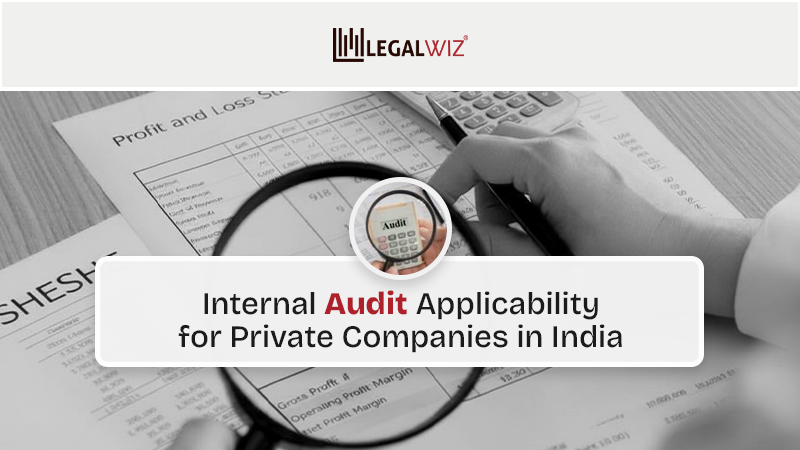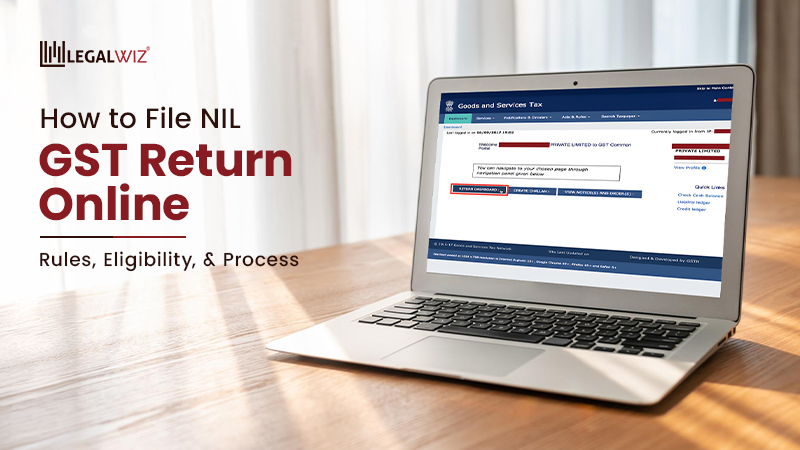Internal Audit Applicability for Private Companies in India
After registration, a private limited company must comply with the Companies Act, 2013. An audit, regardless of company size, turnover, or industry, is one of the most crucial part of the annual compliance for a company.
A company audit is essentially a review of its financial records to ensure accuracy and proper maintenance. A firm hires an auditor to review the financial accounts and provide an unbiased assessment. The auditor checks books of accounts, vouchers, and other documentation to ensure all transactions are documented.
Want to learn about the Appointment of Auditor? Here’s the detailed guide on the Auditor, who they are, what their role is and the procedure: Appointment of Auditor: A Comprehensive Guide
In this blog, we will understand what an internal audit is and which private companies fall under the criteria for conducting the audit for their business.
1. What is a Company Audit?
A company audit involves a thorough examination of financial records to ensure accuracy and compliance with legal requirements. The auditor evaluates the company’s accounts and supporting documents to form an independent opinion on the reliability of the financial statements.
For private limited companies, this process is an annual legal obligation under the Companies Act, 2013, helping maintain financial transparency and supporting informed decision-making by management and stakeholders.
Understand the importance of conducting an Audit for your company with our detailed blog: Audit – An Imperative Process for Company Annual Compliance
2. Types of Audits for Private Companies
Private limited companies in India may need to conduct different audits depending on their operations, turnover, and statutory requirements. Here’s why you need to have an audit annually: Is an audit a mandatory requirement for your business?
Each audit type serves a specific purpose and ensures that the company meets compliance and governance standards.
Statutory Audit
This audit is mandatory for all private limited companies and examines the accuracy of financial statements. It provides stakeholders with confidence in the company’s reported financial position.
Here are the key points:
- Covers all books of accounts, vouchers, and financial statements
- Confirms compliance with the Companies Act, 2013
- Conducted annually before the company’s AGM
Internal Audit
Internal audits help management evaluate business processes and operational efficiency. They are required only for companies meeting certain criteria. Highlights include:
- Focuses on process improvements, risk management, and internal controls
- Mandatory for companies with:
- Turnover of ₹200 crore or more in the previous financial year
- Borrowings of ₹100 crore or more from banks or financial institutions
- Can be performed by employees or an independent professional
Cost Audit
This audit applies to companies engaged in specific goods or services under the Companies (Cost Records and Audit) Rules, 2014. It ensures that cost records are accurate and in line with regulatory standards. Key aspects:
- Required for companies crossing prescribed turnover thresholds
- Conducted by a practicing cost accountant
- Helps verify production or service costs for management and regulatory purposes
3. Internal Audit Applicability Under Companies Act, 2013
Not all private companies are required to conduct an internal audit. If the Companies Act states that if your business crosses certain thresholds, then you must appoint an internal auditor.
A private limited company is required to have an internal audit under Section 138 of the Companies Act, 2013, read with Rule 13 of the Companies (Accounts) Rules, 2014, if:
- Every listed company
- Unlisted public companies, if any of the following criteria are met (in the preceding financial year):
- Paid-up share capital ≥ ₹50 crore; Turnover ≥ ₹200 crore;
Outstanding loans/borrowings from banks/financial institutions > ₹100 crore; - Outstanding deposits ≥ ₹25 crore.
- Paid-up share capital ≥ ₹50 crore; Turnover ≥ ₹200 crore;
- Private companies, if either:
- Turnover ≥ ₹200 crore in the preceding financial year, or
- Outstanding loans/borrowings > ₹100 crore from banks/financial institutions.
The primary purpose of the internal audit is to help management maintain effective internal controls and monitor operational efficiency. It enables the company to:
- Review financial performance and identify discrepancies early
- Assess internal processes and operational risks
- Support better decision-making by providing timely insights into business performance
Internal audits thus act as a management tool in addition to fulfilling statutory compliance requirements, ensuring the company runs efficiently and transparently.
4. Scope and Process of Internal Audit
The Board or Audit Committee, together with the internal auditor, determines the scope, methodology, and periodicity of the internal audit.
Internal audit typically reviews:
- Internal controls
- Risk management
- Compliance
- Operational processes
The exact scope and focus depend on what the board defines, allowing the audit to address the company’s specific needs and priorities.
5. Appointment of Auditors
After a private limited company is registered, it must appoint the required auditors to comply with statutory obligations. Manny’s business gets confused between the auditor and compliance offer, and due to their responsibility, ends up assuming both are the same. Thus, it’s essential to learn the distinction of both roles: Difference between Auditor & Compliance Officer
The appointment process varies depending on the type of audit:
Statutory Auditor
The statutory auditor is responsible for examining the company’s financial statements and providing an independent opinion. Key points for appointment:
- Must be appointed within 30 days of company registration.
- Appointment is confirmed at the first Annual General Meeting (AGM).
- Tenure of office follows the provisions of Section 139 of the Companies Act, 2013, with reappointment and rotation rules applicable as per the Act.
- Must be an independent Chartered Accountant (CA) or CA firm practising in India.
Internal Auditor
The internal auditor reviews the company’s internal controls, processes, and operational efficiency. Appointment details:
- Can be internal staff or an external professional.
- External auditors may include a CA, cost accountant, or any professional approved by the board.
- Required for companies meeting specific turnover or borrowing thresholds under the Companies Act, 2013.
Note: Statutory auditor… is not eligible to provide the service of internal audit as per Section 144
Cost Auditor
A cost auditor ensures compliance with cost accounting regulations for companies producing goods or providing specified services. Key appointment points:
- Must be appointed within 180 days from the start of the financial year.
- Appointment can only be made to a practicing cost accountant or a firm/LLP of cost accountants.
6. Due Dates and Compliance for the Company Audits
| Type of Audit | Key Compliance Requirements | Due Dates |
| Statutory Audit | – Audit report submitted to the board before AGM – Financial statements filed in Form AOC-4 – Annual return filed in Form MGT-7 | – Form AOC-4: within 30 days of AGM – Form MGT-7: within 60 days of AGM – AGM: within six months of the financial year-end |
| Internal Audit | – Report submitted to the board for review – Helps management assess operational efficiency and controls | – No fixed statutory due date – Better to submit before AGM |
| Cost Audit | – Cost audit report submitted to the board – Board files Form CRA-4 with Central Government | – Report to board: by 30 September – Form CRA-4 filing: within 180 days from the end of the FY |
Companies must hold their AGM within the Companies Act deadlines. Compliance requires knowing the maximum AGM gap. Read the complete blog: ROC AGM Extension: Maximum Time Gap Rules Explained
7. ROC Forms for Audit Compliance
Private limited companies in India must file specific forms with the Registrar of Companies (ROC) to comply with audit requirements. These forms ensure proper appointment of auditors and submission of financial and cost audit reports.
| ROC Form | Purpose |
| Form ADT-1 | Appointment of company auditor (statutory) |
| Form AOC-4 | Annual filing of company financial statements |
| Form MGT-7 | Filing of company annual return |
| Form CRA-2 | Appointment of cost auditor |
| Form CRA-3 | Submission of cost audit records to the board |
| Form CRA-4 | Filing of cost audit report with the Central Government |
Note: Non-filing of these forms or failure to submit audit reports on time can attract penalties under Section 450 (general penalty), Companies Act, 2013.
Learn what Form ADT-1 is, who needs to file, what the requirements are and everything in our blog: Form ADT-1 for Appointment of Auditor: Due Date, Filing & Late Fees
Conclusion
In India, every private limited company has to go through a statutory audit. This makes sure that the financial records are right and that the Companies Act, 2013 is followed. If turnover or borrowings go over certain limits, internal or cost audits must be done. Following audit rules makes things clearer, speeds up daily tasks, and keeps you from getting fined. Also, your firm can benefit from seeking professional help when it needs to do audits or send in the right ROC papers. LegalWiz offers its expertise to make your company’s online annual compliance process an easy part of your business.
Frequently Asked Questions
Do all private companies need an internal audit?
Only private firms exceeding set revenue or loan limits must carry out internal audits as per the Companies Act, 2013.
Can company employees do an internal audit?
Yes, your company employees can perform internal audits. Also, an independent professional, such as a CA or cost accountant approved by the board, can do audits.
What’s the difference between an internal audit and a statutory audit?
- Statutory Audit: Mandatory, examines financial statements for legal compliance, and is submitted to ROC.
- Internal Audit: Focuses on operational efficiency, internal controls, and management insights; mandatory only for prescribed companies.
What are the penalties for not filing audit reports on time?
Non-filing of audit reports or ROC forms can attract penalties under the Companies Act, 2013. Timely filing and proper documentation are essential to avoid fines.

Sapna Mane
Sapna Mane is a skilled content writer at LegalWiz.in with years of cross-industry experience and a flair for turning legal, tax, and compliance chaos into clear, scroll-stopping content. She makes sense of India’s ever-changing rules—so you don’t have to Google everything twice.
One Comment
Leave A Comment








Asking questions are really good thing if you are not understanding something totally, but this post provides fastidious understanding
yet.